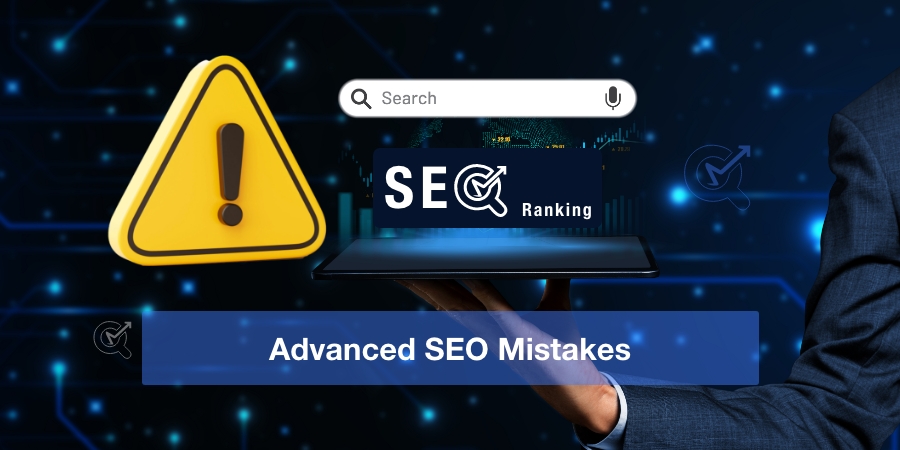SEO is always changing, so keeping your website up to date can be challenging since some crucial SEO mistakes can ruin your rankings. Knowing the most common errors can reduce technical problems and improve website performance. Let’s say you want to rank your business in the UK without making any mistakes. In this case, you should hire a reliable SEO agency to improve your business’s SERP ranking with professional SEO services in London.
Even the smallest SEO error can hurt your digital marketing approach. Ultimately, it can result in the entire marketing strategy for your content failing miserably. Keeping your digital marketing strategy on track means avoiding some of the most common SEO mistakes. The purpose of this post is to shed some light on some advanced SEO mistakes you might want to avoid. Let’s get started.
Advanced SEO Mistakes to Avoid in 2022
The following are some of the top SEO mistakes that you should avoid.
Implementing SEO Tips Without a Plan
Consider starting your road trip without a GPS. Many things can go wrong, like taking the wrong turn, taking a longer route, or ending up at the same spot.
The same applies to SEO. Getting your stuff to appear as search query replies requires a solid SEO strategy. SEO best practices will help you achieve your high goals, boosting sales, increasing conversions, or ranking higher on Google.
Despite this, 70% of small companies lack an SEO strategy. Changing your strategy and developing a competitive approach will help you rank better.
Not Understanding the Search Intent of your Audience
Having a thorough understanding of your target demographic is key to SEO. The truth is that many SEO specialists believe they know their audience, but this isn’t always the case.
Their lack of understanding of client preferences and behaviour, along with their search purpose, is a big problem. Ensure that your entire operation supports the search algorithm in connecting the user to the most relevant, accurate, and current content.
Choosing the Un-optimised Keywords

The biggest SEO mistake is choosing the wrong keywords or using them the wrong way. Often, the chosen keywords are not optimised for the content. How often you use your chosen keywords in your content greatly affects search engine rankings. As a result, your content is unlikely to rank well in search engines.
In other words, the earlier you use the keyword phrase, the higher its chances of appearing in search results. Your first paragraph of content should generally include it.
In addition, this minor adjustment can persuade search engines to give your article the highest ranking. You should avoid keyword stuffing, which is detrimental to Google’s search engine rank.
Avoiding Long-Tail Keywords

Most authors focus on precise and concise keywords when creating content. They think long-tail keywords would bring in less traffic. Adding long-tail keywords can boost the SEO value of your site. Ranking in search engines is easier when there is a lower difficulty level.
Even though they have a smaller search volume, these keywords are relevant to your business. It’s much more likely to convert because it targets a specific group of clients. Additionally, long-tail keywords are more likely to generate clicks because they are more precise. Additionally, it increases your conversion rate.
Creating Duplicate Content

It’s important to write engaging content that answers readers’ questions and adds value to their lives. Your content may not appeal to them if it’s duplicated and plagiarised.
Search engines penalise websites with poor or duplicate content. Without quality content, search engines won’t view your website as the best-searched result. So, another SEO mistake firms make using duplicate or copied content.
Search engines will view it spam if you put copied information on your website. When evaluating the position of your content in search results, Google is picky about this. Ensure you write original content without plagiarism while demonstrating the user’s intent. Make sure you don’t just edit or copy-paste already published stuff.
Un-optimised Meta Tags
Using meta descriptions lets search engines connect your pages’ subject areas to the keywords and phrases users search for. When you use keywords in your title tags, you can create an interesting and attention-grabbing link that users will click on. Meta descriptions give you a chance to include keywords and related phrases.
Unless you create a meta description, Google will generate one based on your search terms. Consequently, you will get mismatched search results. You should make them as specific and personalised as possible. Your title tags and meta descriptions should include relevant keywords and the right length.
Fashion brands, for example, find it difficult to develop unique product descriptions, so they must offer unique value in other parts of their landing pages. Using unique metadata will increase your site’s impact on the SERPs to the greatest possible extent.
Inappropriate Use of Headings
The heading of every paragraph or article should indicate what the content is about. Search engines find it difficult to understand the content that has a short and unclear heading. In other words, it should never be too long but must be long enough to convey the idea.
The H1 header tag is equally important for the Google crawler to understand the content. Most content writers make mistakes using several H1 heading tags within the same piece of information. It can sometimes confuse the search engine bot about the actual heading of the material.
The number of headings in your content matters more than just the H1 tags or the short, unclear headings. Being an SEO specialist means capturing all possible online searchers. Therefore, you need to create different headings for different search terms. As a result, your potential customers will understand what they are reading, and your SEO will improve.
Creating Mobile-Unfriendly Content
According to Google’s 2018 announcement, mobile-first indexing will be the default setting. Websites with non-mobile-friendly content will have trouble climbing search engine rankings. Google’s mobile-friendly test can also tell you whether your website is mobile-friendly.
People are increasingly accessing the internet on mobile devices, so Google has to favour sites that load quickly and are mobile-friendly. So, it’s imperative to make websites mobile-friendly and SEO-friendly.
Ignoring Internal and External Link Optimisation
Adding high-quality external links to the article is crucial for SEO. Focusing on quality rather than quantity is more important. It’s not a good idea to include external links from any website.
Whenever you link to another website, make sure it has a high Domain Authority (DA) and relevance. Further, having backlinks from your website is always beneficial. You might eventually get a lot of traffic back.
When you publish content, keep track of articles that point to related articles. Additionally, it will provide clarity. Moreover, you should not add internal links unrelated to posts’ topics.
You might hurt your ranking if you put too many links in one piece of content. It is generally advisable to focus on quality links rather than adding many.
Not Keeping Up with Current SEO Trends
Take a look at popular blogs, YouTube channels, and websites. Their presentations will cover the latest update and trends in SEO. Maintain a thorough understanding of current trends and recommended procedures. It will provide you with more information.
It prevents you from using outdated SEO strategies. There’s always something new going on with Google’s search algorithm and SEO trends. Adopting SEO strategies that Google no longer believes are effective is pointless. Be aware of new trends and use them to your advantage. Make your website mobile-friendly and searchable by voice.
URL that is Not Optimised
Choosing the right URL for your website or page can significantly impact SEO. The URL structure or keyword relevancy is important to pay attention to. Google checks URLs a lot when indexing and ranking web pages. To overcome this, you can create a URL that matches the information on the page.
Make sure the URL matches the content. Keeping your URLs short is key. Using these best practices will help your website rank higher in search engines.
Incomplete On-Page SEO
‘On-page SEO’ refers to specific techniques applied to certain web elements. Some businesses only use a portion of their website’s on-page optimisation. Businesses commit this error frequently.
You must do many things for on-page SEO, including page titles, meta descriptions, alt-tags, and captions. Additionally, header tags, image optimisation, and headings are common. Only one or two of these will have a minimal impact on your search visibility.
Disregarding User Experience
Ensure that your landing pages are easy to use for your visitors. It affects how long they stay on your site. Visitor retention increases the likelihood of a sale.
Having excellent content and an easy-to-navigate website is essential for keeping visitors interested. UI/UX design is important for your website. It’ll boost your brand’s visibility and trust. An enjoyable browsing experience encourages deeper engagement and boosts brand trust.
Choosing good fonts and colours will improve the user experience. Consequently, your search engine ranking will improve.
Call to Action Missing
A call to action (CTA) button is especially effective. When performing SEO, people frequently overlook this SEO mistake. A few examples of frequent CTAs are “Sign up,” “Call us,” and “Buy now.” When you have these buttons on your website, you have the chance to retain visitors.
Make sure that every page contains a call-to-action button. Be careful not to go overboard. Creating CTAs as buttons isn’t always necessary. Use compelling sentences on your website to persuade users to take action.
It reduces uncertainty for users by making navigation easier. Putting CTA buttons carefully on your website gives it a polished look.
Keeping Older Content
Websites that are dynamic and flow with new content perform best. Having dated content or design elements on your website makes it harder to rank in search engines. A website that doesn’t get updated frequently loses users and search engine ranking. Furthermore, it portrays your company in a negative light.
Ensure that all the materials on the site are up-to-date. Remove outdated content that no longer resonates with your audience. With an SEO company’s help, you can easily eliminate this problem. SEO businesses employ copywriters. You’ll get consistently new content for your website from them.
Leaving Results Untracked
Be sure to track the results of your digital marketing and SEO efforts. It is a common error that many businesses make. Keeping track of all the data points related to your SEO efforts is important. It is a good method for finding any errors.
Make use of Google Analytics and other well-known reporting platforms. You can use them to get a daily breakdown of significant parameters. It is part of user reviews, visitor traffic, and site ratings. Monitoring SEO performance indicators requires advanced analysis tools.
These tools can help you raise your rankings. You should restructure your SEO approach if a particular technique doesn’t work.
Lack of Competitor Analysis
Take a look at your competitors’ marketing tactics. We often forget about this when doing SEO. The competitive analysis provides rich insights into SEO. Consumers prefer one brand over another for various reasons.
SEO can give you insightful business information about your competitors. Consider your competitors’ websites before making a change to your own. You can plan your website’s layout and content based on your research. Using these insights, you can develop a powerful SEO strategy.
The Takeaway
SEO is a field that is constantly changing, so anyone who uses it on their website will need to keep learning. The algorithms for search engines will affect the quality of SEO advice in the future. Meanwhile, you can improve your SEO efforts by avoiding these SEO mistakes.





